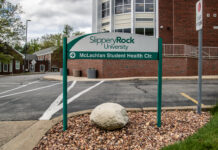A potential strike by faculty members of the Association of Pennsylvania State College and University Faculties (APSCUF) could be on the way, with discussion between the group and Pennsylvania’s State System of Higher Education (PASSHE) still ongoing.
Kenn Marshall, spokesman for the state system, said the most recent contract expired in June of 2015 and discussion for a new contract has been going on for about two years.
“It’s unfortunate that it takes this long and it’s a difficult process,” Marshall said. “One of the things that slowed us down is we spent the first part of that year and a half trying to come up with a one-year extension.”
Marshall said the deal offered to APSCUF originally would allow them to receive a raise in January in exchange for changes in their healthcare plan. They did not agree on the extension that was offered to them twice.
Colleen Cooke, vice president of the Slippery Rock University chapter of APSCUF and recreational therapy professor, said a lot of the discussion consisted of the union making proposals and not being addressed.
“There was no productive conversation,” Cooke said.
Cooke said that in June of 2016 a proposal was received from PASSHE that proposed 249 changes. Cooke said the number of proposed changes was unheard of.
“Personally, to me, that said they don’t really want to negotiate, that’s not good faith bargaining,” Cooke said.
Although some small progress has been made, legislative delegates from the 14 campuses that APSCUF represents have voted on Aug. 25 to take a strike authorization vote that will take place from Sept. 7-9.
If the faculty authorizes the strike then Kenneth M. Mash, president of APSCUF, would have the authority to call a strike.
Cooke said APSCUF above all wants fairness in the bargaining process, stating that deans, presidents and provosts in the PASSHE systems continue to get sizeable raises.
Cooke said that the of the 249 changes many of them would impact students’ education. One of these changes would allow administrators to move faculty among different departments and to other campuses. Another would allow teachers without graduate degrees to teach.
“We’re afraid of the quality of the education going down should the proposed changes be written in,” Cooke said. “It decreases the value of (the students’) diploma.”
Marshall said that about three-quarters of university operating costs is funded through student tuition fees and that any settlement would impact students.
“We have to take that into consideration first and foremost,” Marshall said.
Marshall said the financial situations of the universities is another area that has to be addressed, with many universities in the state system facing difficult financial challenges. Marshall said that state funding, which accounts for the other one-fourth of operating costs, is the same amount of funding that the universities received in 1999.
“That’s 17 years ago, not even considering inflation,” Marshall said.
Although the state universities have received increases in funding the past two years, the state system is still down about 40 to 50 million dollars from before the recession in 2008.
Marshall said that APSCUF seeking increases in salary is understandable but that the group is also adding some new costs.
“Our faculty receive a tuition waiver for their spouses and they want that included to include all fees as well,” Marshall said.
These fees would include activity fees, recreational center fees and health centers fees, which Marshall said average about $1500 a year.
“They’re asking us to pay for memberships for themselves and their spouses,” Marshall said. “The students pay for those, so why should the faculty get those for free? But that’s something the faculty is asking for.”
Marshall said that APSCUF has held similar votes for strike authorization in each round of negotiations dating back to 1999.
“We hope it doesn’t come to that and we’re committed to staying at the bargaining table as long as it takes and continue to bargain in good faith and come up with a fair settlement,” Marshall said.
Marshall said that each of the universities has made a strike response plan if a strike should be called.
If the professors go on strike they would not be on campus, nor fulfill other duties such as reviewing graduation credentials or advising.
“If the state system engages in fair and faithful contract negotiations, we won’t strike,” Cooke said. “If we strike, no one wants to strike for long.”







